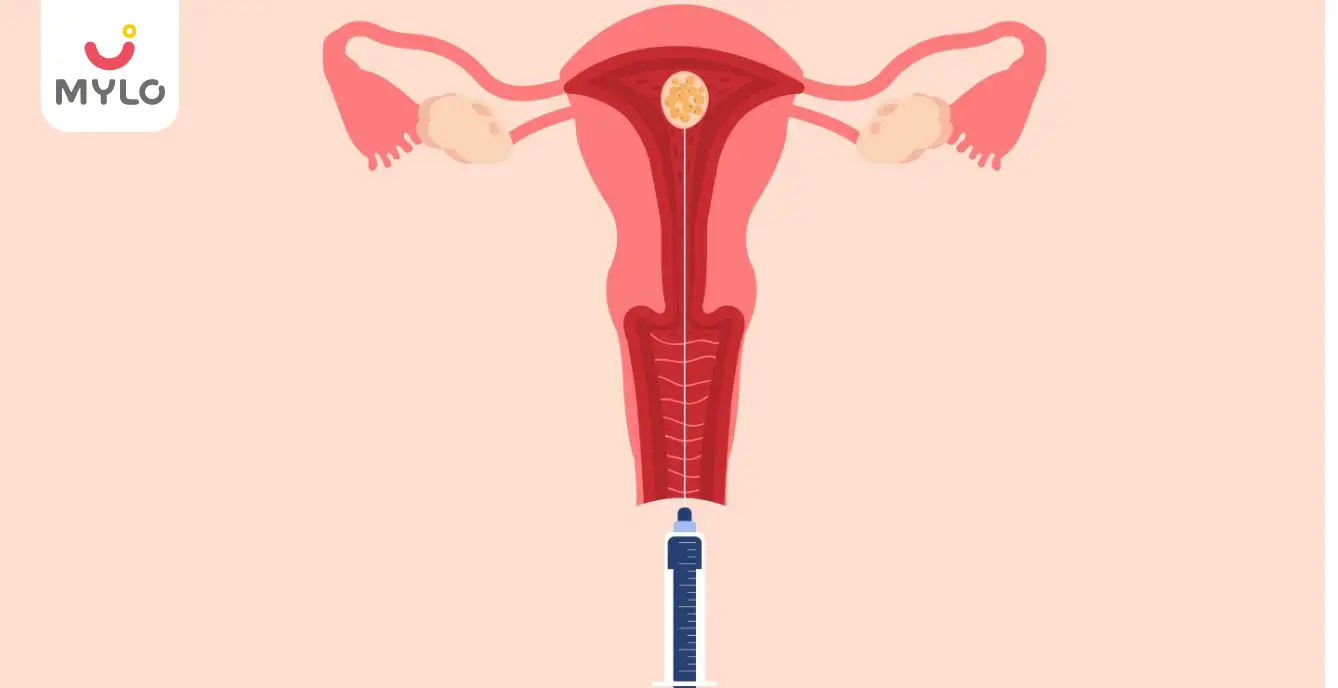Get MYLO APP
Install Mylo app Now and unlock new features
💰 Extra 20% OFF on 1st purchase
🥗 Get Diet Chart for your little one
📈 Track your baby’s growth
👩⚕️ Get daily tips

OR


Article Continues below advertisement
- Home

- Fertility Test for Men and Women: What to Expect and Next Steps
In this Article
- When to Consider Fertility Tests?
- 1. Age
- 2. Irregular Menstrual Cycles
- 3. Known Health Conditions
- 4. Previous Reproductive Issues
- How to Prepare for Your Appointment at the Fertility Clinic?
- 1. Gather Relevant Medical Information
- 2. Make a List of Questions
- 3. Understand Your Insurance Coverage
- 4. Discuss with Your Partner
- 5. Consider Emotional Support
- 6. Follow Pre-Appointment Instructions
- Male Fertility Tests
- 1. Semen Analysis
- 2. Hormone Testing
- 3. Genetic Testing
- 4. Testicular Ultrasound
- 5. Post-Ejaculation Urinalysis
- 6. Anti-Sperm Antibody Testing
- Female Fertility Tests
- 1. Ovulation Testing
- 2. Hormone Testing
- 3. Ovarian Reserve Testing
- 4. Hysterosalpingography (HSG)
- 5. Transvaginal Ultrasound
- 6. Laparoscopy
- 7. Genetic Testing
- Understanding Your Test Results
- Next Steps After Fertility Testing
- Treatment Options Available for Infertility
- 1. Medications
- 2. Intrauterine Insemination (IUI)
- 3. In Vitro Fertilization (IVF)
- 4. Intracytoplasmic Sperm Injection (ICSI)
- 5. Surgery
- 6. Assisted Hatching
- 7. Donor Options
- 8. Surrogacy
- Key Takeaways
- References
Getting Pregnant
Fertility Test for Men and Women: What to Expect and Next Steps
Updated on 2 August 2023



Medically Reviewed by
Dr. Shruti Tanwar
C-section & gynae problems - MBBS| MS (OBS & Gynae)
View Profile

The journey of starting a family can bring both excitement and curiosity. Couples often want to understand their fertility better, so they can make informed decisions. That's where fertility test for men and fertility test for women come in. Fertility tests help uncover important information about your reproductive health.
This guide explains what you can expect during these tests and what you should do next based on the results. So, let's begin our journey and explore the fine details of fertility tests, taking one step closer to fulfilling your dream of becoming a parent.
When to Consider Fertility Tests?
If you and your partner have been actively trying to conceive for a year or more without success, it may be an excellent time to consider fertility testing. However, there are certain situations where you may want to seek testing earlier:
Article continues below advertisment
1. Age
If the woman is over 35, it is recommended to consider a fertility test for women after six months of trying to conceive, as fertility tends to decline with age.
2. Irregular Menstrual Cycles
If the woman has irregular or infrequent periods, it might be beneficial to get tested earlier, as irregular cycles can be a sign of potential fertility issues.
3. Known Health Conditions
If either partner has a known medical condition that may affect fertility, such as polycystic ovary syndrome (PCOS) or endometriosis in women, or low sperm count in men, it's advisable to seek fertility tests for men and women sooner.
4. Previous Reproductive Issues
If you or your partner have experienced previous reproductive issues, such as miscarriage or unsuccessful pregnancy, it's a good idea to consider fertility testing earlier to identify any underlying causes.
How to Prepare for Your Appointment at the Fertility Clinic?
Preparing for your fertility clinic appointment can help ensure you make the most of your visit. Here are some steps to consider:
Article continues below advertisment
1. Gather Relevant Medical Information
Collect any medical records or test results related to your reproductive health.
2. Make a List of Questions
Jot down any questions or concerns you have about your fertility journey. This will help you remember everything you want to discuss during the appointment.
3. Understand Your Insurance Coverage
Familiarize yourself with your health insurance policy and determine the covered fertility services.
4. Discuss with Your Partner
If you have a partner, involve them in the preparation process. Discuss their medical history, concerns, and questions. It's crucial to have open and honest communication to approach the appointment as a team.
5. Consider Emotional Support
Dealing with fertility issues can be emotionally challenging. Contact a support network, such as friends, family, or infertility support groups. Having emotional support can help alleviate stress and provide comfort during fertility tests.
Article continues below advertisment
6. Follow Pre-Appointment Instructions
The fertility clinic may provide specific instructions for preparation, such as fasting requirements or avoiding certain medications. Carefully follow these instructions to ensure accurate fertility test results and a productive appointment.
You may also like: What is Reproductive Endocrinology?
Male Fertility Tests
A fertility test for men aims to evaluate their reproductive health and potential fertility. These tests help assess various factors that can affect male fertility.
Here are some standard male fertility tests:
1. Semen Analysis
A semen analysis is the primary fertility test for men. It involves providing a semen sample, which is then analyzed in a laboratory. The study assesses sperm count, motility (movement), morphology (shape), and overall sperm health. Abnormalities in these parameters can indicate potential fertility issues.
Article continues below advertisment
2. Hormone Testing
Hormone tests measure hormone levels in the blood, such as testosterone and follicle-stimulating hormone (FSH). These fertility tests help identify hormonal imbalances affecting sperm production and overall reproductive function.
3. Genetic Testing
Genetic tests may be recommended to detect congenital abnormalities that could impact fertility. For example, a karyotype analysis can identify chromosomal abnormalities that may affect sperm production or function.
4. Testicular Ultrasound
A testicular ultrasound uses sound waves to create images of the testicles. It helps identify structural abnormalities, such as varicoceles (enlarged veins in the testicles) or blockages in the reproductive tract.
5. Post-Ejaculation Urinalysis
This fertility test for men evaluates the presence of sperm in the urine after ejaculation. It helps determine if sperm flow backward into the bladder instead of being expelled through ejaculation (retrograde ejaculation).
6. Anti-Sperm Antibody Testing
Anti-sperm antibody tests check for antibodies that may attack and impair sperm function. These antibodies can be produced by either the male or female partner, hindering fertility.
Article continues below advertisment
Female Fertility Tests
A fertility test for women is designed to assess their reproductive health and potential fertility. These tests help identify factors affecting a woman's ability to conceive.
Here are some standard female fertility tests:
1. Ovulation Testing
Ovulation tests help determine if and when a woman is ovulating. These female fertility tests can be done using urine or blood samples to detect the presence of luteinizing hormone (LH) or changes in other hormonal levels that indicate ovulation.
2. Hormone Testing
Hormone tests measure the levels of hormones like estrogen, progesterone, follicle-stimulating hormone (FSH), and luteinizing hormone (LH) in the blood. These tests can help identify hormonal imbalances affecting ovulation and overall reproductive function.
3. Ovarian Reserve Testing
Ovarian reserve tests evaluate the quantity and quality of a woman's eggs. They can include blood tests to measure levels of certain hormones like FSH, LH, and anti-Müllerian hormone (AMH). An ultrasound may also assess the number of follicles in the ovaries.
Article continues below advertisment
4. Hysterosalpingography (HSG)
HSG is an imaging test that examines the uterus and fallopian tubes. A dye is injected into the uterus, and X-ray images are taken to check for abnormalities or blockages that may interfere with conception.
5. Transvaginal Ultrasound
A transvaginal ultrasound uses a probe inserted into the vagina to create images of the reproductive organs. It helps identify issues such as ovarian cysts, uterine fibroids, or structural abnormalities that may impact fertility.
6. Laparoscopy
In some cases, laparoscopy may be recommended. It is a surgical procedure where a tiny camera is inserted through a small incision in the abdomen to examine the pelvic organs directly. It can help diagnose conditions like endometriosis, pelvic adhesions, or blocked fallopian tubes.
7. Genetic Testing
Genetic tests may be recommended to identify any genetic conditions that can impact fertility, such as chromosomal abnormalities or genetic disorders that could affect reproductive health.
Understanding Your Test Results
You can interpret the fertility test results with the help of a healthcare professional. While it is easy to understand a few reports as their reference range is provided, it requires specialized medical knowledge to understand other reports. It is best advised to talk to your infertility specialists before making any inferences.
Article continues below advertisment
Next Steps After Fertility Testing
After fertility tests, the following steps may vary depending on the test results and individual circumstances. Here are some general next steps that are commonly considered:
- Consult with your fertility specialist
- Review treatment options
- Develop a treatment plan
- Address modifiable factors
- Seek emotional support
- Review insurance coverage and financial planning
- Consider a second opinion
Treatment Options Available for Infertility
Various treatment options are available for infertility, depending on the underlying causes and individual circumstances. Here are some standard treatment options:
1. Medications
Fertility medications are often prescribed to address hormonal imbalances, stimulate ovulation in women, or improve sperm count and motility in men.
2. Intrauterine Insemination (IUI)
IUI involves placing prepared and concentrated sperm directly into the woman's uterus around the time of ovulation. This procedure helps increase the chances of sperm reaching the fallopian tubes and fertilizing an egg.
Article continues below advertisment
3. In Vitro Fertilization (IVF)
IVF is a widely used assisted reproductive technology. It involves retrieving eggs from the woman's ovaries, fertilizing them with sperm in a laboratory, and transferring the resulting embryos into the uterus. IVF can be performed using the woman's eggs and partner's sperm or involves the use of donor eggs, sperm, or embryos.
4. Intracytoplasmic Sperm Injection (ICSI)
ICSI is a specialized form of IVF where a single sperm is injected directly into an egg. It is typically used in cases of male infertility, such as low sperm count or poor sperm motility.
5. Surgery
In some instances, surgical procedures may be recommended to correct anatomical abnormalities that affect fertility. For example, surgical repair of blocked fallopian tubes. The decision to undergo surgical intervention depends on result of fertility test for men and women.
6. Assisted Hatching
Assisted hatching is a technique used during IVF, where a small hole is created in the embryo's outer shell (zona pellucida) to facilitate its implantation in the uterus.
7. Donor Options
In severe fertility challenges, donor eggs, sperm, or embryos may be considered.
Article continues below advertisment
8. Surrogacy
Surrogacy involves using a gestational carrier to carry and give birth to a baby for individuals or couples who cannot have a pregnancy themselves.
The treatment choice will depend on factors such as the cause of infertility, age, overall health, personal preferences, and financial considerations.
Key Takeaways
In conclusion, fertility test for men and women can help uncover underlying factors that may impact a couple's ability to conceive. Remember, fertility challenges can be overwhelming, but with the guidance of healthcare professionals and advancements in reproductive medicine, various treatment options are available to help individuals and couples achieve their dream of having a baby. By staying informed, proactive, and optimistic, the path to parenthood can become more apparent, and the hope of starting or expanding a family can become a reality.
References
- Carson, S. A., & Kallen, A. N. (2021). Diagnosis and Management of Infertility: A Review. JAMA
- Pelzman, D. L., & Hwang, K. (2021). Genetic testing for men with infertility: techniques and indications. Translational Andrology and Urology
- Sunder, M., & Leslie, S. W. (2020). Semen Analysis. PubMed; StatPearls Publishing.





Medically Reviewed by
Dr. Shruti Tanwar
C-section & gynae problems - MBBS| MS (OBS & Gynae)
View Profile


Written by
Sanju Rathi
A Postgraduate in English Literature and a professional diploma holder in Interior Design and Display, Sanju started her career as English TGT. Always interested in writing, shetook to freelance writing to pursue her passion side by side. As a content specialist, She is actively producing and providing content in every possible niche.
Read MoreGet baby's diet chart, and growth tips

Related Articles
Related Topics
RECENTLY PUBLISHED ARTICLES
our most recent articles

Periods
Reason for Irregular Periods After Marriage: A Comprehensive Guide

Conception
How Soon Can You Get Pregnant After Stopping the Pill?

Fertility
Watery Semen: Is It Normal or a Sign of an Underlying Condition?

In Vitro Fertilization (IVF)
Embryo Transfer: The Ultimate Guide to Procedure, Success Rates and FAQs

Male Infertility
Hyperspermia: The Ultimate Guide to Understanding Excessive Semen Production

Reproductive health
Painful Ejaculation and Its Impact on Men's Health: From Stigma to Solutions
- Hypospermia: What Every Man with Low Semen Volume Should Know
- Eye Flu Alert: The Seasonal Epidemic You Need to Know About
- How Many Days After IUI Should I Get My Period: Understanding the Timeline
- An Expecting Mother's Guide to Glucose Tolerance Test (GTT)
- Difference Between IUI and IVF: Which is Better for You?
- Ovarian Stimulation: Understanding the Process and What to Expect
- IVF Baby Delivery: Will You Have a C Section or Vaginal Delivery?
- How Many Injections for IVF Treatment Do You Really Need
- IUI Failure Symptoms & Reasons: Understanding Why IUI Fails & What to Do Next
- Fever During Breastfeeding: Tips from Experts for New Moms
- Indian Food to Increase Breast Milk: Everything You Need to Know
- Lactose Intolerance in Babies: A Parent’s Guide to Identifying and Managing it
- TESA IVF: How This Procedure Can Help You Achieve Your Dream of Parenthood
- How Can You Encourage Sensory Play for Your Baby and What are Its Benefits?


AWARDS AND RECOGNITION
Mylo wins Forbes D2C Disruptor award
Mylo wins The Economic Times Promising Brands 2022
AS SEEN IN
















At Mylo, we help young parents raise happy and healthy families with our innovative new-age solutions:
- Mylo Care: Effective and science-backed personal care and wellness solutions for a joyful you.
- Mylo Baby: Science-backed, gentle and effective personal care & hygiene range for your little one.
- Mylo Community: Trusted and empathetic community of 10mn+ parents and experts.
Product Categories
baby carrier | baby soap | baby wipes | stretch marks cream | baby cream | baby shampoo | baby massage oil | baby hair oil | stretch marks oil | baby body wash | baby powder | baby lotion | diaper rash cream | newborn diapers | teether | baby kajal | baby diapers | cloth diapers |








